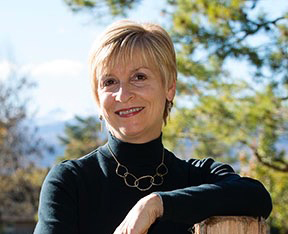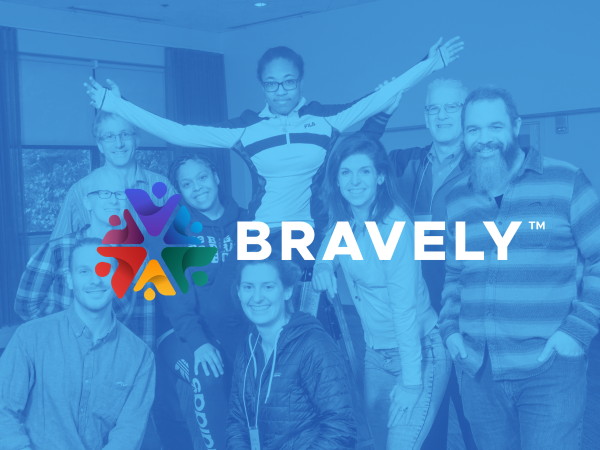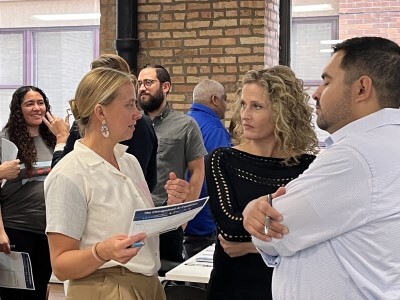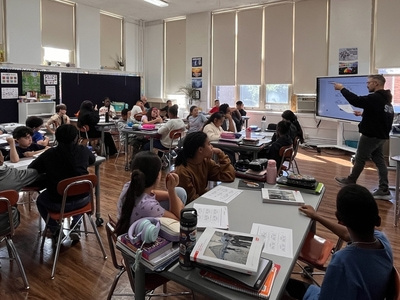Professional Learning
Educator-to-Educator Learning: The Transforming Learning Collaborative
Topics
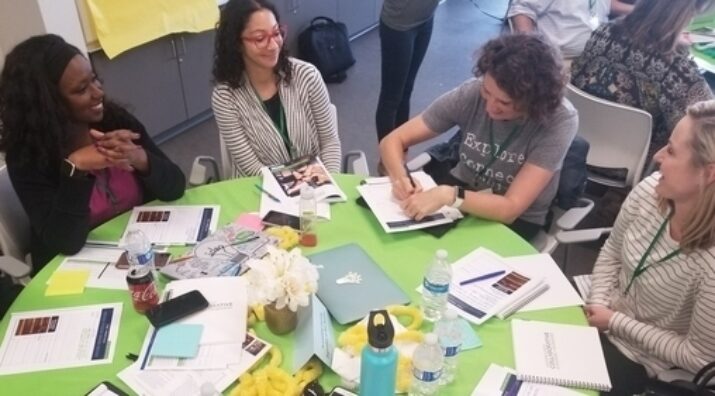
Educators are the lead learners in schools. If they are to enable powerful, authentic, deep learning among their students, they need to live that kind of learning and professional culture themselves. When everyone is part of that experiential through-line, that’s when next generation learning thrives.
Practitioner's Guide to Next Gen Learning
The Transforming Learning Collaborative provides educator-to-educator professional learning in support of learning/school redesign. Key ingredients are authentic, real-world contexts, experiential learning, collaboration, and mentoring.
I believe in relationships. The TLC Incubator isn't just a conference where you go and listen. It's about building a relationship and having a deeper connection.
—Kim Merritt, Transforming Learning Collaborative Co-founder and Mentor
A colleague recently asked me to describe the most powerful professional learning I ever experienced in my career as an educator. My first response was a groan and some ill-concealed eye rolling. Like many of you, I had suffered through countless days in windowless district offices, listening passively to someone droning on about the latest educational fad.
Then I realized that my friend was not asking about a professional development (PD) event; he was asking about professional learning. I was suddenly transported 20 years into the past to find my answer. My most positive and meaningful learning arose from a mentorship with an experienced teacher. A couple of hours each week with my mentor, co-creating learning, observing and reflecting on each other’s classroom practice, and sharing day-to-day struggles and triumphs taught me more than hundreds of hours of traditional PD.
Relationship-building, personalization, and authentic educator-to-educator professional learning made that mentorship a memorable—and enjoyable—experience for me, and it is these same qualities that underlie the work of the Transforming Learning Collaborative, a partnership between Schools That Can, NGLC, and Da Vinci Schools.
The TLC launched in early October at Da Vinci Schools in El Segundo, CA, with a workshop-based conference and a kickoff of the Transforming Learning Incubator, a year-long professional learning experience provided by educators for educators who are engaged in learning redesign and whole-school transformation. For this edition of Friday Focus: Practitioner’s Guide to Next Gen Learning, I spoke to organizers and participants about key features of this kind of educator professional learning, including:
- Authentic, real-world contexts
- Experiential learning
- Collaboration and mentoring
Learning Starts With Authentic Experiences
If we're trying to build new knowledge with teachers, we need to teach that knowledge explicitly. If we're trying to change practice, we need mentoring and coaching. But if we want to change mindsets, we need to start with teachers experiencing authentic experiential learning themselves.
—Tony Siddall, NGLC Program Officer and TLC organizer
Unlike most education conferences, the TLC conference took place in a school building—Da Vinci’s Wiseburn campus—while classes were in session. Learners filled the hallways and classrooms, and participants had numerous opportunities to engage with educators and students. According to Kim Merritt, director of Da Vinci Extension (DVX), Da Vinci’s postsecondary college bridge program, the choice of site was intentional, an essential “part of the authentic learning experience. It’s fun and energizing because you are exposing people to a day in the life. You are not looking at empty classrooms and imagining what might happen.”
It also presents a more realistic and attainable picture of what next gen learning looks like in practice, she believes. “Oftentimes in PD we showcase the best of the best, but this is the real world of schools. Real things are happening, like addressing student behavior and the day-to-day work of teaching and learning. It’s not like a game of Candyland with a beautiful path,” Kim explains, “so it’s not off-putting. Participants can see this work is possible even with all the crazy realities of a “real” day in schools.”
According to NGLC’s Tony Siddall, a highlight of the TLC Incubator kickoff was the tourism-themed “Great TLC Signature Practices Hunt” organized by Da Vinci. Armed with a scavenger hunt app on their smartphones, school teams ventured out across multiple Da Vinci campuses in search of next gen learning practices to observe and document. With prompts like, “Go to the engineering lab and make a contraption using at least 10 Vex Robotics parts” and “Find a student in a math class to show you an error analysis they have completed and submit a photo of it,” participants experienced and demonstrated learning much as the students do each day.
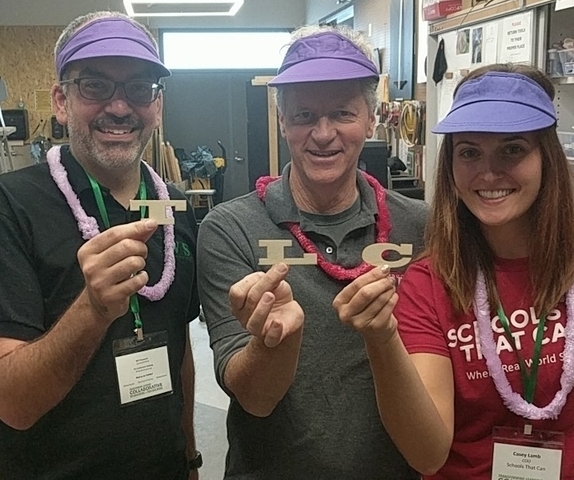
NGLC’s Tony Siddall and Andy Calkins, along with Casey Lamb from Schools That Can, demonstrate their learning after visiting Da Vinci Design’s Fab Lab maker space.
To Tony, this activity exemplified next gen professional learning: “This was more authentic than the typical guided school tour where they lead you around and tell you stuff. It mirrors the personalized learning they do regularly. It was self-directed and performance-based. You had to do something or make something. It was aligned to Da Vinci’s practices and a very inviting way to see a school and experience its culture.”
Kim echoes these ideas as she explains some of the thinking behind the conference and the scavenger hunt in particular: “Do with adults what you do with kids. Why shouldn’t professional development look more like what we’ve learned to do with students in the classroom?”
Another “thing that was cool” about inviting participants into classes for the scavenger hunt, she says, was that it allowed them “to feel that learning is not segmented.” Da Vinci has aligned its signature practices to NGLC’s MyWays Student Success Framework, and the Da Vinci team envisioned this activity as an opportunity “to see all four MyWays domains (Habits of Success, Creative Know How, Wayfinding Abilities, and Content Knowledge) in action. Habits of mind are not just taught in an advisory,” she observes. “They are part of Physics, too. They can be happening in any class.”
Transformational Learning Is Collaborative
Schools That Can believes that the best way to learn is by seeing and doing. This is just as true for students, who need opportunities to apply new learnings in the real world instead of listening to a sage on the stage, as it is for teachers. The TLC initiatives do just that, by helping educators see what is possible by visiting mentor schools and learning from peers, and they facilitate interactive and personalized adult learning experiences.
—Casey Lamb, Chief Operating Officer at Schools That Can
The TLC Incubator is founded on collaboration and building relationships between newcomers and mentor schools who have demonstrated strong commitment to next gen learning. These mentors have embraced whole-child, 21st-century definitions of student success, like the competencies of the MyWays Student Success Framework, and innovative approaches to learning such as real-world learning.
In addition to Da Vinci Schools, TLC partners for the 2018-2019 cohort include pioneering schools and districts from across the U.S. like Building 21 and The Workshop School in Pennsylvania, Chicago Tech Academy and Distinctive Schools in Illinois, Valor Collegiate Academy in Tennessee, and, from California, Lindsay Unified School District, Thrive Public Schools, and Vista Unified School District.
Between in-person events like the conference, site visits to mentor schools, and the Schools That Can Forum in the spring, TLC Incubator school teams will engage in personalized, virtual learning around a self-selected learning design strand, such as Project-Based Learning or K-8 School Design. For Kim, who serves as a mentor in the college extension (CollegeX) strand for participant YouthForce NOLA in New Orleans, LA, one of the TLC’s guiding questions was, “How can we identify where great practice is happening and then, through codified materials and supportive touchpoints, streamline the learning?” Kim notes, “The way I learn best, and I think others do, too, is when I have a codified base to start from, and mentorship to help me imagine how to apply it in our space, with our localized students’ needs at the center of the design process.”
The TLC’s relationship-building approach was a key factor for Kristen Watkins, director of personalized learning for Dallas Independent School District (Dallas ISD) in Dallas, TX. Of the seven school teams participating in the TLC’s inaugural cohort, three come from Dallas ISD: Ignite Middle School and Personalized Learning Preparatory, both in their first year of learning transformation, and CityLab High School, which is in year two of learning redesign.
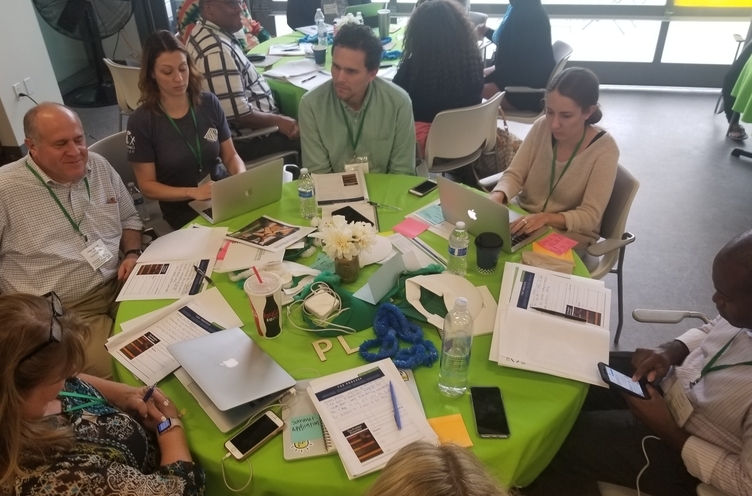
Team members from CityLab High School Dallas, TX, create a transforming learning action plan for the coming year.
In the past, Kristen had attended convenings of NGLC Regional Funds partners and Next Generation Systems Initiative districts and found that “experiencing other schools was so empowering. Learning presented by educators for educators really stood out for us because it aligned to what we believe about the work.”
Speaking about what the TLC offers in support of Dallas ISD’s personalization journey, she notes, “Getting to see what happened at Da Vinci and the other cooperating schools—watching similar things in different contexts—creates more ‘a-ha’ moments and helps us with our own barriers. The chance to learn from others doing this work nationally solidified the idea that we are stronger together. Working together means all of our kids will have better outcomes.”
According to Kim, the TLC Incubator’s focus on forging relationships is mutually beneficial. “Being a mentor is not a one-way street. I happen to be a mentor for YouthForce NOLA right now, but they are also mentoring me, showing me what they’ve been doing to support students in wayfinding and exploring careers. I see that and say, ‘Hey, this could really work at my school.’”
In addition, Kim points to the support for in-person and virtual events that the TLC provides for the mentoring schools: “What often stood out for me was how many people wanted to come to Da Vinci and how many people we wanted to learn from. In the past you had to set these experiences up as one-offs because there wasn’t really a structure for it. The TLC offers a way for mentor schools to build the capacity to support newer models—it creates a continuous learning network that is accessible to all.”
Kristen also expresses excitement around sharing with the wider field what this year’s Dallas ISD cohort is learning: “Our hope for participation in the TLC is that in years to come we will be able to scale this mentorship within Dallas ISD, for these school leaders to serve as mentors for new schools, and help others by paying it forward.”
Resources
- The TLC Incubator Participant Overview provides details about the Transforming Learning Collaborative, including the founding principles, descriptions of the TLC Incubator school design strands, events for the coming year, and links to mentor schools and districts.
- If you are interested in creating a similar experiential adult learning activity, here is The Great TLC Signature Practices Hunt task list, along with a presentation deck explaining how to play.
- This matrix of Da Vinci Schools’ Signature Practices illustrates how these practices map to the competency domains of the MyWays Student Success Framework.
- Dallas Independent School District’s Personalized Learning Coaching and Development Tool, a non-evaluative centerpiece of Dallas ISD’s approach to teacher training and support, defines five domains and twenty high-leverage teacher and student actions which distinguish effective personalized learning environments.
- The Dallas ISD Personalized Learning Readiness Continuum is scaffolded across four levels of readiness and has been designed to identify where schools are in their journey to personalization of learning.
- The MyWays Toolkit supports classrooms, schools, and districts to learn from the work of fellow educators as they take on the trickiest challenges of educating students for Habits of Success, Creative Know How, Content Knowledge, and Wayfinding Abilities.

